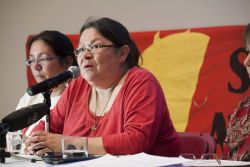Coop média de Montréal
Journalisme indépendant
CKUT Off the Hour: "La destruction totale": Why the Plan Nord should be stopped, and how aboriginal women are leading the charge
Élyse Vollant, Denise Jourdain, and Ellen Gabriel speak out against environmental exploitation

Denyse Jourdain, along with Ellen Gabriel and Élyse Vollant, formed a panel on the Plan Nord at Concordia on Friday, September 28th. (Michael Paolucci/The McGill Tribune)
This piece was originally aired on CKUT's Off the Hour on Friday, October 6th, 17h-18h.
The Plan Nord has never been a popular one. From the get-go, Jean Charest’s pet plan to mine in Northern Québec has been criticized as a sap on Quebec’s resources, rather than a boon to its suffering budget. While the mining would surely yield profits, the structure of the plan all but guarantees that the lion’s share of those profits would go to the mining companies, rather than benefit the Québec taxpayer. While Charest promised that the plan would yield enough jobs to justify its fiscal and environmental costs, studies have shown that this would probably not be the case (À qui profite le Plan Nord, IRIS).
The Plan Nord’s most passionate and visible protesters, however, have focused little on these problematic aspects of the plan. Indigenous women have been integral to organizing against the Plan Nord, and in drawing attention to the underlying ideological problems of which the Plan Nord is an obvious symptom. Above all else, these women emphasize the importance of respecting the natural world, taking only what we need, and leaving the world in a state that’s liveable for future generations.
They have also spoken prominently about mining’s detrimental effects on the indigenous communities near the mining activity. Not only are they adversely affected by the environmental impact, but it’s typical for there to be a large spike in violence against women (particularly, rape) in the aboriginal communities adjacent to mines.
Élyse Vollant is one of the women who has been most vocal in her opposition to land exploitation legislation, like the Plan Nord. Élyse is a mother of eight and grandmother of two, and she sees the problems of environmental justice as being integrally wound up with family; both ancestry and the generations to follow. When I spoke with Élyse Vollant at a protest against the Plan Nord, she explained what she imagined would be the side effects of the Plan Nord, and other projects similar to it.
“Quand on parle du Plan Nord, c’est sur c’est les mines. Eux-autres, ils disent qu’ils vont tout reparer. Moi je me dis que si tu me donnes ta veste puis que là moi je commence à tout découper ta veste en petit morceaux puis là je prends un morceau de ta veste puis je te le redonne, comment va être ta veste? Il va être vraiment plein de cicatrices. Moi je veux pas laisser à ma génération futur avec pleins de cicatrices. C’est ça qui va arriver parce que jamais, jamais, jamais, il vont pouvoir dire qu’ils vont tout replacer comme c’était, c’est destruction totale.”*
Élyse Vollant, along with Denise Jourdain and Ellen Gabriel, spoke at a discussion at Concordia, hosted by Concordia’s 2110 Centre for Gender Advocacy. The talk was entitled Defending the Land: Indigenous Women’s Resistance to Plan Nord and community violence. The women spoke about how they became involved in advocacy and activism, and how they saw the Plan Nord in the scope of the larger socio-political system that we live in.
While much of what the women said at the discussion could be considered to fall within the framework of the mainstream environmental movement, like the emphasis on sustainability, there was also another aspect to what they said that is much more rare among environmentalists. It seemed like they had a genuine emotional connection to the natural world and were emotionally affected by Jean Charest’s plan of environmental exploitation in a way that many environmentalists might not identify with (although they might like to).
It is perhaps this emotional connection to the earth that has made their movement so powerful; it concretizes the issue in a way that much environmental activism fails to. It forces a discussion about what we have to sacrifice in order for the earth to be liveable for our descendants. It links environmental exploitation with other forms of oppression which are often more overtly emotional and therefore more likely to inspire action. Speaking with these women and watching them speak, it was impossible not to share their concern, and to want to do something about it.
*translation: “When we talk about the Plan Nord, we’re talking about the mines. They say that they’re going to repair everything. But what I think is that if you give me your jacket and I start to cut it into tiny pieces and then I take one of those pieces and I give it back to you, what’s your jacket’ going to look like? It will be full of scars. I don’t want to leave my future generations full of scars. That’s what’s going to happen, because they can’t ever, ever, ever say that they’ll be able to make everything the way it was, it’s complete destruction.”
Photos by Michael Paolucci, courtesy of The McGill Tribune.
About the poster
Comments
Very good article, Carla.
Very good article, Carla.
The site for the Montreal local of The Media Co-op has been archived and will no longer be updated. Please visit the main Media Co-op website to learn more about the organization.





